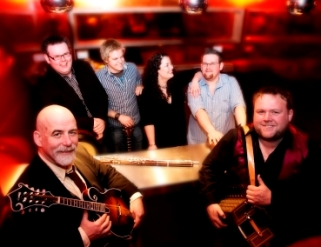
David Munnelly Band @ FolkWorld:
FW #27,
#30,
#32,
#39
![]() www.myspace.com/paulkellymando
www.myspace.com/paulkellymando
www.davidmunnelly.com
FolkWorld Issue 40 11/2009; Article by Petr Pandula
Keep Doing What We Do
Paul Kelly on Irish Society and Irish Music
The global economy and especially Ireland are these days seriously affected by the banking crises. The new values of commercialism, prosperity and unlimited growth which were driving the Irish society during the times of the Celtic Tiger don’t seem to have last. They are leaving a serious vacuum behind. Does Paul Kelly see this is a chance for the Irish traditional music to step in and fill this vacuum with values which are less commercial but more timeless?
“Well, firstly I don’t know if commercialism, prosperity and unlimited growth are new values in Irish society. It’s just that we never had the chance to prosper to such an extent.
 David Munnelly Band @ FolkWorld:
www.davidmunnelly.com |
“As musicians, I don’t think that the new values and the Celtic Tiger affected us to a great extent. Sure, there have been government grants available to us and while they were welcomed, they didn’t make that much difference to our income. Surviving as professional musicians in a country as small (and musically talented) as Ireland has always been a struggle and always will be, unless you are in the tiny minority who genuinely hit the big time.”
“The hope is that those most negatively affected by the downturn are forced to question their own value system and in realising that the possession of material goods and being able to take multiple foreign holidays every year is not necessarily the correct path to contentment. And then maybe, just maybe, a realisation that less materialistic pursuits, like community spirit, a genuine concern for other people’s plight, and taking part in shared activities, like sport, music and art, is by far a more fulfilling way to proceed. And with this new set of values the musician and artist may find a new role and an increased receptiveness from his or her audience. This is what I would like to think would happen. We will keep doing what we do. It’s how our role is to be perceived in the future that’s important.“
Should Irish traditional music and song remain neutral or rather take part in asking challenging questions in relation with the economical and moral crisis of the island nation?
“Well, there will always be songwriters and singers who will use their position to point out injustices in society and I think that will continue. But whether a traditional Irish band playing reels and jigs and singing songs of bright May mornings and thrushes singing sweetly in bushes can become a force for political change is something I doubt. Though what may be possible is that bands and artists could begin to align themselves with just causes and add their voice to what may hopefully become a new set of moral standards.”
Is the current crises an opportunity for Folk music to be a voice for the people effected by it?
“I think I already answered this but I will say that Folk music should always be a voice for people, no matter what they are affected by. “
You already toured Germany and Switzerland before. What do you like about it and what is different to play concerts here than in Ireland.
“Ever since The Dubliners played in Germany and Switzerland in the sixties there has been a vast market in these places for Irish Folk music, and indeed Folk music in general. The audiences are always enthusiastic and receptive and this is much appreciated by the travelling bands. The only concern is that the age of the average concert goer on the continent for our music tends to be a bit on the high side, while the Irish bands seem to get younger. This age discrepancy is a worrying trend and it illustrates one of the differences between Irish and German/Swiss audiences.”
|
|
Photo Credits:
(1) Paul Kelly
& David Munnelly Band,
(2) Irish Folk Festival Logo
(by Magnetic Music).
|
To the German FolkWorld |
© The Mollis - Editors of FolkWorld; Published 11/2009
All material published in FolkWorld is © The Author via FolkWorld. Storage for private use is allowed and welcome. Reviews and extracts of up to 200 words may be freely quoted and reproduced, if source and author are acknowledged. For any other reproduction please ask the Editors for permission. Although any external links from FolkWorld are chosen with greatest care, FolkWorld and its editors do not take any responsibility for the content of the linked external websites.
